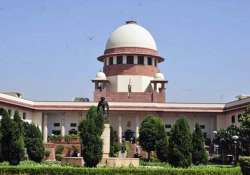Farmers move SC against promulgation of ordinance on land
New Delhi: Several farmers' organisations today approached the Supreme Court challenging the re-promulgated land ordinance as “unconstitutional” and ultra vires of the Constitution and terming it as “colourful exercise of power” by the executive usurping

New Delhi: Several farmers' organisations today approached the Supreme Court challenging the re-promulgated land ordinance as “unconstitutional” and ultra vires of the Constitution and terming it as “colourful exercise of power” by the executive usurping law-making powers of the Legislature.
The petition filed by Bharatiya Kishan Union, Gram Sewa Samiti, Delhi Grameen Samaj and Chogama Vikas Avam, sought a direction to restrain the government from acting upon in furtherance of the Right to Fair Compensation & Transparency in Land Acquisition, Rehabilitation & Resettlement (Amendment) Ordinance, 2015.
The farmers' bodies said the government's action in promulgating successive ordinances bypassing the legislative process of Parliament was not only “arbitrary and violative” of Article 14 but also a “fraud on the Constitution” itself. They said government's action in re-promulgating the ordinance was “malafide” and thus open to challenge. The government “deliberately” did not move the 2015 bill for discussion in the Rajya Sabha after its passage in the Lok Sabha between March 10 and 20 “due to lack of its numbers, political will or consensus,” the petition said in which Ministries of Law and Justice, Parliamentary Affairs, Home Affairs, Rural Development and Cabinet Secretariat have been made parties.
The petition termed the continuation and re-promulgation of ordinances as “colourful exercise of power” on the Executive's part and said that in a democratic process, people cannot be governed by laws made by the Executive. The petitioners also said the “deliberate proroguing” of the Rajya Sabha on March 28, “whilst it was in budget session only for the oblique and malafide purpose of re-promulgating the impugned Ordinance goes against the very spirit and raison de'etre underlying Article 123 of the Constitution”.
Asserting that the government has “abandoned all principles of Constitutional morality” by re-promulgating the ordinances, the petition said “adherence to the principles of constitutional morality by the different organs of government is as much a mandate to be enforced strictly like the letter of the written Constitution”.
It said the discretionary power of the President to promulgate ordinances has to be exercised “judiciously” and within the strict paradigm of circumstances, circumscribing the exercise of such discretion under Article 123. The law-making function under the Constitution was vested in Parliament, it added.
“It is submitted that if the Executive was permitted to continue the provisions of an ordinance by issuing successive ordinances without submitting the same to the voice of the Parliament, it is nothing but usurpation by the Executive of the law-making powers of the Legislature,” the petition said. It said merely because the executive does not have the numbers in the Rajya Sabha, nor the political will, it cannot be permitted to continue the law-making exercise by way of an Ordinance.
“Life and liberty of citizens cannot be regulated by Ordinances” and the “Executive cannot indirectly arrogate to itself the law making function of the Legislature,” it said.
“The ordinance making power under Article 123 was never meant to be a substitute to overcome lack of numbers of the executive in one house,” the petition said.